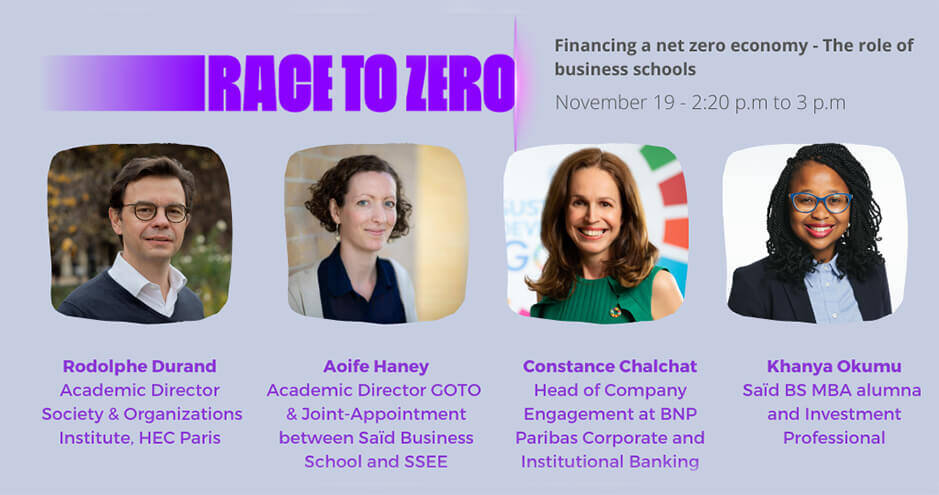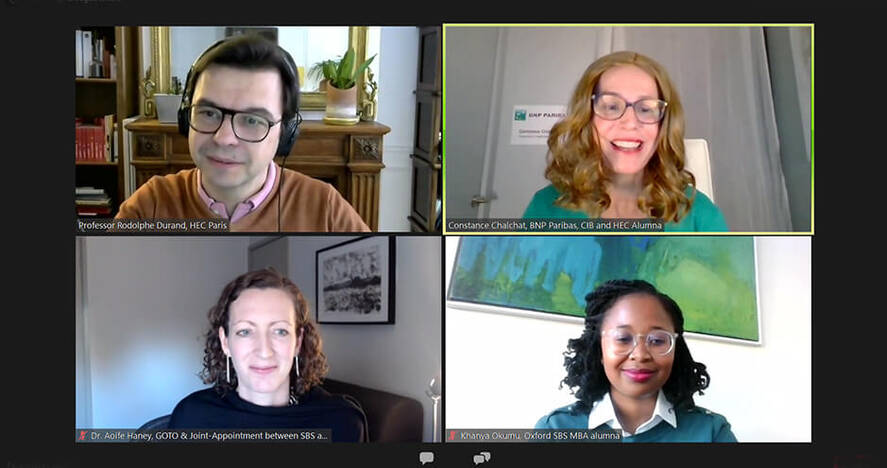HEC Paris and Saïd Business School Join Dialogue on Race to Zero
The 2020 Race to Zero campaign mobilized academics, business professionals and militants in a 11-day November series of virtual dialogues on climate-related issues, climaxing with the November 19 Finance Day. Organized by the U.N., its director Sagarika Chatterjee invited Rodolphe Durand, academic director of the HEC Society &Organizations Institute, to share with panelists his center’s research in, and approach to, the role of business schools in targeting a net zero economy.

What changes should business schools instigate in their curricula to answer the challenges climate change are posing for the business world? This was the focus of the four-person debate moderated by HEC Paris professor Rodolphe Durand. Around the virtual roundtable, Durand invited BNP Paribas head of company engagement, Constance Chalchat (H93), Saïd Business School academic director Aoife Haney and Khanya Okumu, Saïd Business School MBA Alumna and investment professional. With one foot in academia, another in the finance industry, South African-raised Okumu has all the credentials to suggest changes which would benefit both worlds: “Business schools need to deliver not only brilliant people, they need to develop mindsets which tackle the complex problems like climate change. To achieve this, they must be part of a network within the university with crossovers into other disciplines. And they must provide the teaching tenets of leadership which will be pro-active and responsible. For, without the right policies, little change can be made. And, without the appropriate finance mechanisms, few leaders will be incentivized to implement scalable solutions to the climate crisis.”
Aoife Haney endorsed the call for more engagement between business schools and different university disciplines. “There are new technologies, new carbon markets, new business models which business schools must pioneer,” said the specialist in systemic environmental challenges and their consequences on business. “And, for this, we need to engage with different disciplines to better target the new geographies and markets that climate change has forced upon business.”
Rodolphe Durand concurred and mapped out the decade-long drive he has been leading at HEC Paris in order to federate professors, researchers and students to work together. “These are transversal issues and we’ve catalyzed dialogue between academics who often don’t talk to each other,” said the director of the Purposeful Leadership Chair. “At the same time, we have built strong rapports with business. This combination allows us to rethink climate-related issues, steering them to answer the pressing needs of society and guiding the decision-makers in corporations.” His work has resulted in the creation of courses which put students in direct contact with the environmental challenges facing business. “For example, we have taken them to the Alps to hear mountains cracking and crumbling under the ecological pressure that is accelerating with industrial development.” Furthermore, the new mandatory Purposeful Leadership program forces the business leaders of tomorrow to ask themselves probing questions: “Students are asked to align their professional goals with their deep personal aspirations. Ultimately, what do they want to achieve in a very complex and disturbing world?”
These are questions that have guided Constance Chalchat ever since she stepped through the doors of BNP Paribas in 2001 to help the bank accelerate sustainable transformation. “To integrate sustainability at the core of the bank’s CSR issues required a deep business shift. To achieve this, we designed a 10-day executive training course for employees coming from all branches and regions to ensure transversality and cross-fertilization. Our goal was to guarantee that 100% of our staff of 40,000 people was knowledgeable on sustainability matters.”
However, Chalchat insisted this is not enough: “We at BNP Paribas do not want to entertain greenwashing. We strongly believe that the development of sustainable trends is conditioned on robust KPIs, reliable data, impact measurement and transparency.” She called on business schools to scale up their training in these fields in order “to groom and train the purpose-driven talents which will irrigate the financial industry with fresh new sustainability views.” It was a call which echoed the convictions shared by Aiofe Haney: “Teaching needs to focus on the future. We are responsible for shaping new visions that avoid doom-and-gloom scenarios. Professors need to guide studies with longer-term objectives that do not focus on maximizing profit. At Oxford University, we work with the financial industry which is critical in changing the underlying rules of the game in pushing towards a future net zero economy. For this, we need a more holistic approach, connecting different disciplines.” Khanya Okumu described one of the core programs in the MBA she took to exemplify these crossovers: “This year, cohorts look at a system reset, reimagining and redesigning systems in the wake of COVID-19. There’s a specific focus on climate, health, economy and social systems as a whole.” The qualified chartered accountant pointed to the GOTO and Creative Destruction Lab programs which also display innovative teaching approaches: “Business schools need to go beyond business plans and KPIs. Students will thus gain a deep understanding of environmental problems, the people and stakeholders which are affected by them and the effects of the solutions proposed.”
Race to Zero is a U.N.-driven campaign designed to rally leadership and support from investors, businesses, cities and regions. It hopes to build a resilient, healthy and zero-carbon recovery which creates decent work and “unlocks inclusive, sustainable growth”. It involves 452 cities, over 1,100 businesses and 549 universities. Collectively, claim the organizers, its backers represent nearly 25% global CO² emissions and more than 50% of the world’s GDP. The November Race to Zero Dialogues will input their conclusions into the UNFCCC Climate Dialogues which culminate on December 4.
